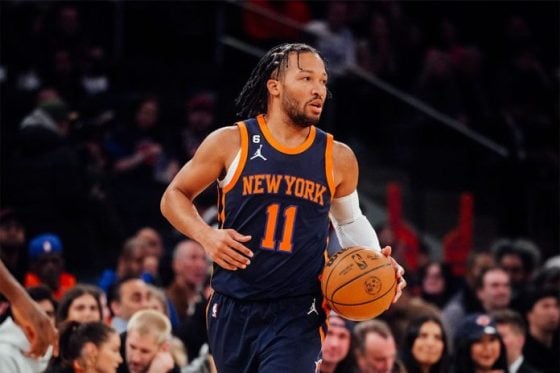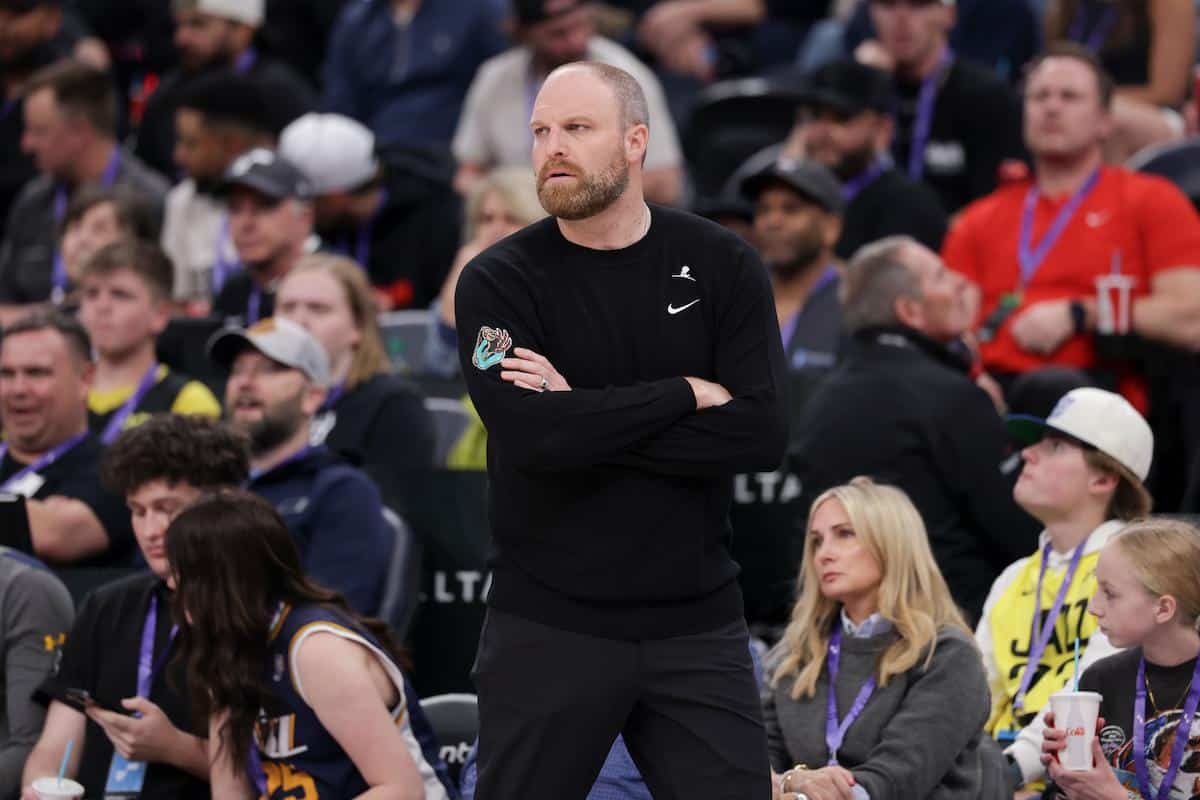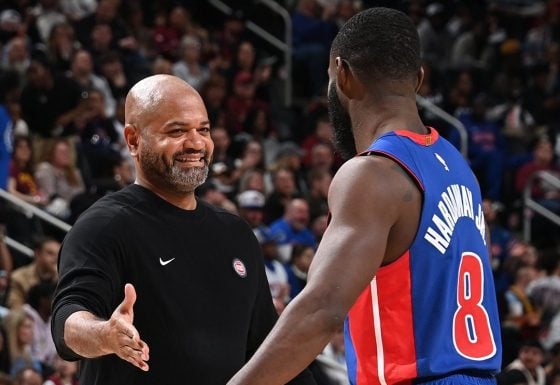The Celtics have now lost three of their last four, this one to a Philadelphia 76ers team whose Big Three has barely shared the court together. But it wasn’t Paul George or Joel Embiid who killed the Celtics. Instead, it was the diminutive Tyrese Maxey who consistently blew past his defenders and got two feet into the paint, where he either finished an increasingly absurd array of layups or sprayed out to Philadelphia’s eager — and uncharacteristically accurate — shooters.
(Side note: May you never find someone who hates you as much as Caleb Martin hates Boston.)
By the end, Maxey had accumulated 33 points and 12 assists. It was yet another in a long line of big games from small guards against the Celtics. We’re just a few weeks from Darius Garland and Donovan Mitchell combining for 57 points on 33 shots with just three combined turnovers. Right after that, it was Ja Morant for 32 and nine.
And those are only in the losses. The Celtics have emerged victorious this season despite big performances from guys like Damian Lillard (33 points on 15 shots) and Cam Thomas (31 points). Even the Wizards’ Jordan Poole has had two good games against Boston in three tries.
This trend dates back to last year’s playoffs when Donovan Mitchell torched the Celtics in three games, scoring 32 points on 52% field-goal shooting and 53% deep-shot shooting before he got hurt.
Now, these are all very good players (give or take a Poole party). Everybody struggles to defend quick guards. But the Celtics aren’t everybody, and they should strive for better.
(Relatedly, Boston has struggled with fast teams since last season. This year, the three teams with the fastest time to a shot — Memphis, Atlanta, and Chicago — have all beaten the Celtics. However, that angle deserves its own story, so we won’t get into it here.)
Jrue Holiday is handsy and physical, but he’s looked a quarter-step slower this season (he missed last night’s game against Philly). He’s been blown by more often this season than I can ever remember seeing before. His advanced metrics, while still excellent, also suggest he’s having his worst defensive performance since his early New Orleans days.
Derrick White is a phenomenal player and defender, but he is at his best as a helper, where he might be the best in the league. He’s a little more vulnerable as a straight-up one-on-one defender.
That leaves us with Jaylen Brown, who, since last season, has often taken on the role of guarding the other team’s quickest guards. Brown has developed into a tremendous close-quarters fighter, using jabs, physicality, and pristine footwork to torture small guards when he can set the terms of engagement. His bullying of Lillard earlier in the season was one of the best on-ball defensive sequences of the season:
And even last night, Brown had success when he picked Tyrese Maxey up high near the halfcourt line, like a boxer pushing their opponent against the ropes:

The problem is that consistently executing that level of individual defense over a full game is untenable. It requires immense energy and can lead to foul trouble. Modern teams are adept at using screens and off-ball work to get weaker defenders switched onto ballhandlers. Even if Brown were prime Kawhi Leonard, he can’t get over every screen, and he needs more help from Boston’s bigs than this:

Containing the swiftest players will always be a team effort that heavily involves the centers. As good as Kristaps Porzingis and Al Horford are, they aren’t the fleetest of foot. Porzingis is a strong shotblocker, but he’s been hampered by injuries and hasn’t looked comfortable in space. Horford, meanwhile, has had plenty of good defensive moments but doesn’t have the minute-by-minute athleticism to contain the best downhill drivers consistently.
It’s not their fault. On the perimeter, virtually no big players have the lateral quickness to keep up with one-cut guards like Maxey, which is why it’s so important to keep him in a box and show early help.
Tatum, in particular, stands to improve. He has spent large chunks of the year guarding centers, which means he’s often the last line of defense. Tatum has generally acquitted himself well in the post and on the boards, and I applaud him for that — guarding up a size is hard and often thankless! But weirdly, he usually seems far more concerned with getting into rebounding position than lending a helping hand:

These struggles aren’t just anecdotal, although they fail the eye test like me when I accidentally enrolled in a grad-level computer architecture class. Want some ugly stats? According to Synergy, the Celtics allow the third-highest points per possession against pick-and-roll ballhandlers. They’re also well below average on hand-offs, a similar offensive mechanism, and isolations. Good on-ball guards do not struggle against Boston like they should on paper.
I’ve talked previously about why giving up shots to pick-and-roll ballhandlers and players in isolation is a good thing overall; those are generally inefficient playtypes. But that doesn’t mean the Celtics can’t try to be better! Screen navigation was a major strength of Boston’s perimeter guys last season, but Holiday, White, and Brown have all been just a little bit worse in that area this season. Maybe they should take some cues from Donald Duck.
Is it effort, the championship hangover effect? To an extent. Is it a lack of communication? At least a little. I’m not sure how many times we’ve seen Holiday and White leveled like a crash-test dummy at halfcourt when they try to pick up a ballhandler high, but I know it’s too many:

The Celtics’ general defensive scheme loathes overhelping. Watch that Maxey clip again; see how reluctant Boston’s other three defenders are to leave their men, and that’s by design. Joe Mazzulla is comfortable letting guys work against Brown, White, and Holiday and living with the results.
Should he be? We’re starting to gather a body of evidence that this strategy may need to be tweaked against certain jitterbug guards. No one in the league leaves his defenders on an island like Mazzulla, and the Celtics’ past defensive successes prove the effectiveness of that strategy. The league is always changing, though. Teams adjust to success. Boston would be wise to bend — at least a little — with them.
The sky isn’t falling. This isn’t a death knell to Boston’s repeat hopes, and they’ve tallied some very good games against scoring guards like Trae Young (who, to be fair, isn’t very quick) and Lillard on different nights. But at the same time, doubling up as a champion is hard, and it means plugging whatever leaks in the Good Ship Russell pop up throughout the season. The Celtics will likely have to face at least two of Maxey, Lillard, Mitchell, and Jalen Brunson (who dropped 34 and 39 in consecutive games against the Celtics last season) in the playoffs. They need to start problem-solving sooner rather than later.






